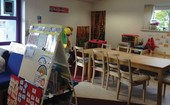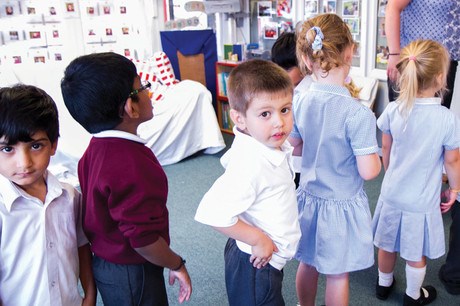A Unique Child: Nurture Groups - Well nourished
Caroline Vollans
Monday, May 30, 2016
Nurture Groups offer children and young people with difficult emotional, social and behavioural needs a safe place within their school where their problems can be addressed. By Caroline Vollans

Nurture and nurturing are terms that are hard to avoid these days. The positive influence of effective nurturing is now a familiar notion. It is no longer an acceptable idea that genes are the main predisposing factor regarding growth, intelligence and mental health. Rather, the quality of early nurturing is seen to have long-term critical effects on emotional and intellectual development. This understanding is something that many schools and education authorities have been taking seriously for quite some time, offering several forms of intervention to both carers and children. One of these is the Nurture Group.
A Nurture Group is a psychosocial form of intervention offering nurturing experiences and the opportunity to develop positive relationships for children and young people. Founded in Hackney, London, in 1969 by educational psychologist Marjorie Boxall, these groups were created as support for those children who arrive in school unprepared to meet the demands of classroom life due to their pressing emotional, social and behaviour needs. The groups have been shown to be pivotal in helping children overcoming language and communication difficulties, developing a range of social skills and regulating their behaviour and emotions.
Nurture Groups and approaches developed from the original model are now widespread throughout schools and other organisations in the UK, and continue to grow.
PRINCIPLES
A Nurture Group is for 12 or fewer children or young people and led by two trained practitioners. Its aim is to address missing or distorted experiences of nurture. The key feature is that it is a predictable and consistent space: the children know when it will be and what to expect. The groups are based on six fundamental principles:
Learning is understood developmentally
The classroom provides a safe base
Nurture is important for the development of well-being
Language is an essential means of communication
All types of behaviour are a form of communication
Transitions are of great importance for children and young people.
Though children are withdrawn from their class to join a group, it is vital that a Nurture Group is a whole-school endeavour: it does not function as a segregated, one-off project. All children who participate remain very much part of the general running of the school, joining in all school activities. The whole school has to be committed to a nurturing ethos, of which the Nurture Group is just one aspect.
ENTRY
Children are assessed for their suitability for taking part in a Nurture Group using the Boxall Profile – a structured and detailed assessment of social, emotional and behaviour functioning. There are two main sections of assessment – the Diagnostic Profile and Developmental Strands – each of which has 34 descriptors against which the child is scored. Examples include: ‘Over-reacts to affection, attention or praise’; ‘Self-disparaging and self-demeaning’; and ‘Listens with interest when the teacher explains something to the class.’ This profile, once completed, functions also as a planning tool, in that the targets for each child will come directly out of it. The children are reassessed regularly using the profile – as well as being a marker of their progress, it is also used to inform decisions regarding the timing and approach to their reintegration into class.
CASE STUDY: WILBURY PRIMARY SCHOOL, LONDON
Wilbury Primary School in the London borough of Enfield has been running a Key Stage One Nurture Group for over 20 years. Though Nurture Groups were prolific during the era of the Inner London Education Authority, many boroughs did not continue with their funding after it disbanded in 1989. The outer London borough of Enfield did remain committed to them, however.
At Wilbury, Angela is the Nurture Group teacher and Pasha the teaching assistant – both are trained as Nurture Group leaders and work full-time at Wilbury. The group runs for four and a half days a week; the remaining half day is for planning, preparation and assessment, and when Nurture Group leaders in the borough get together for training and sharing expertise.
At the moment there are eight children in the group. Children are assessed if their class teacher or teaching assistant is concerned about them and think they may benefit from nurture work. Angela makes an initial observation of them in their class setting, and their class teacher and assistant do two observational assessments based on their day-to-day working knowledge of the child: this will include things such as ability to concentrate, social interactions, level of co-operation and capacity to express feelings. Angela says, ‘It is always interesting at this stage to see the similarities and differences between the observations made by each adult – it’s useful to have both.’
The next stage of assessment is the Boxall Profile to check that the children meet the necessary requirements. If so, a meeting is then arranged with the carer/parent(s) for permission to join the group.
Length of time
Children can stay in the group for up to four terms, after which they are re-integrated into their class. They are assessed every term using the Boxall Profile. ‘It’s the best model we have,’ says Angela, ‘but, as with all structured assessment, it’s not without limitations. It can happen that a child is going through a difficult patch due to their personal circumstances, and their scores may not appear progressive – dips have to be expected at such times. It isn’t a linear model and we can’t interpret it in this way.’
Over time, as the children begin to show benefits from being in the group, they do more and more with their class. Occasionally, some children are ready to return to class sooner than the standard four terms. ‘Points of transition and change can be inherently harder for these children, so we try to manage them very carefully and in a way that is particular to each of them – one approach does not fit all,’ says Angela.
Routines and environment
 The shape of the day and the nurture room environment are necessarily routine and predictable – the children are guided through the day by the use of a visual timetable. The children start the school day in their class with their peers and class teacher for assembly and the first session of the morning. After this, they are collected by Angela or Pasha and taken to the nurture room.
The shape of the day and the nurture room environment are necessarily routine and predictable – the children are guided through the day by the use of a visual timetable. The children start the school day in their class with their peers and class teacher for assembly and the first session of the morning. After this, they are collected by Angela or Pasha and taken to the nurture room.
The room has a kitchen area with a dining table where they have breakfast; a role-play area with a range of clothes; an area with a sofa to provide a relaxed and informal atmosphere; a book area with cushions; an area with basic classroom furniture and equipment; easy-access toilets; and its own outdoor play area. It is attached to a sensory room, too.
Their first activity together is focused on having a time to talk about how the children are feeling that day. This can be shared with the group, otherwise spoken privately to Angela or Pasha. ‘Listening to the children is a huge part of our work,’ says Angela, ‘Being able to carefully listen is hard in a busy mainstream classroom – we only have eight children and are able to prioritise it.’
Next comes a shared breakfast. ‘This is a lovely and important time of the day,’ says Angela. ‘We don’t rush it. Some of the children come to school hungry and benefit from a nutritious breakfast. There are also those children who seem to overeat due to their particular emotional state – we will pick up on this during our one-to-one work.’ Friday is a special breakfast day – it is Egg Day.
 On Egg Day the children can choose any sort of eggs for their breakfast, whether it is scrambled, fried, poached, boiled or pancakes. ‘The children really look forward to their Friday breakfasts and trying eggs prepared in different ways,’ says Angela.
On Egg Day the children can choose any sort of eggs for their breakfast, whether it is scrambled, fried, poached, boiled or pancakes. ‘The children really look forward to their Friday breakfasts and trying eggs prepared in different ways,’ says Angela.
After breakfast, the morning’s activities are focused on the regular Numeracy, Literacy and Science curriculum. During this part of the day, the Nurture Group functions very much like their class, but with the advantage of much fewer children. Once a week they have a specialist music teacher.
The children join their class peers for play times, PE and lunch – they can receive additional adult support for these times if they need it.
After lunch the children return to a nurture room, set up with a whole range of enticing materials for Busy Time: art, sand and water, sensory, construction, reading, mark-making and book-making. The children are free to choose what they would like to do. For the staff, this is personal, social, health and economic (PSHE) time, when they focus on the particular child’s strands, doing such things as joining in with the child’s play, building on their play and social interactions and having circle time.
Finally, the ending of the day is like the beginning – the children join their peers in their classroom.
Parental involvement
Facilitating and supporting engagement with parents and carers is fundamental to nurture work. Parents can be helped by practitioners to see their child in a more positive way and to become more aware of alternative ways of interacting with them.
‘Getting parents and carers involved can be a challenging, though imperative, part of our work,’ says Angela.
Angela and Pasha use the start and end of the day as opportunities to speak to parents. In addition to what the school offers parents (including advisors, parenting classes, English for Speakers of Other Languages (ESOL) classes and coffee mornings), the Nurture Group makes further efforts to communicate with them. For example, the children write personal letters of invitation to their parents for class and school events.
However, Angela points out that, ‘Opportunities to engage with parents can be limited because of the influences of other circumstances. This can limit the impact of the Nurture Group.’
While Wilbury and schools in Enfield offer a standard version of the original Nurture Group, there are different forms of nurture work going on in the UK. However, over the years the term ‘Nurture Group’ has been over-used, referring to various one-to-one or small group activities. Whether it is a Nurture Group or work based on one, it is fundamental that it is a safe space determined by the six fundamental principles; it cannot function effectively as a ‘pop-up’ but must be integrated into the whole school and reflect its nurturing ethos.
In order to maintain the integrity and effectiveness of Nurture Groups and approaches, it is important to have fidelity to the original model so that the significant value they have for children and young people is not compromised.
FACTS AND FIGURES

The Nurture Group Network (www.nurturegroups.org) provides a clear definition of what a group is, outlines the approach, gives evidence of its effectiveness and offers training and publications.
According to the network, over 62 academic studies in the past 20 years have shown that children and young people attending Nurture Groups are more likely to improve in social and emotional functioning than their peers who remain in the mainstream class.
Its own 2014 pilot study, involving some 100 Nurture Groups and 139 three- to 15-year-olds, found:
The social and emotional well-being of all the children improved significantly, according to their Boxall Profile test scores, by attending a Nurture Group.
Three in five of the primary children involved had experienced significant trauma, including exposure to family conflict, abuse, divorce, a new home or school, hospitalisation, death of a loved one, parental drug-taking and maternal depression.
Nearly a fifth (19 per cent) of primary students in Nurture Groups had a diagnosed psychiatric disorder, with ADHD the most common.
The average child was a Key Stage 1 boy living with his single mother and at least one other sibling and having little or no contact with his father. He was highly likely to have experienced significant trauma at some point in his life, and his mother was likely to suffer from some kind of mental illness. His behaviour at school was most likely to be described as aggressive, unco-operative and distracted and he suffered from lack of self-esteem. Though described as bright, his volatile behaviour was hindering his academic success significantly. He was more than likely to have a strained relationship with his peers and have no school friends. After attending a Nurture Group, he was likely to have at least one more friend at school, a better relationship with his parents or carers, and be more likely to reach a state of attentive calm in the mainstream classroom, allowing him to improve significantly his attainment, attendance and self-confidence.
Children achieving levels at or above age-appropriate targets made up half of the children in the study. Both above- and below-average children made similar gains in their social and emotional well-being by attending the group.
Numbers
According to the network’s 2015 census, there were 2,114 schools with Nurture Groups: 1,876 in primary schools and 238 in secondary schools.
Commenting on its Nurture Group, one Devon school said, ‘Our primary Nurture Group has been running for more than two years: our Key Stage 1 pupils attend five mornings a week; Key Stage 2 pupils two mornings a week; and our nurture graduates are free to return one afternoon a week if they wish. We have seen significant improvements in attendance and reduced exclusions, as well as an increased love of school, confidence, attainment and self-esteem.
‘Whole-school planning is integral to the success of our Nurture Group and we have weekly meetings with mainstream staff where progress is discussed and targets can be reassessed. One of the most integral components of our Nurture Group is the involvement of parents and carers – they are an implicit part of the selection, monitoring and resettlement processes and are welcome to NG sessions.’





